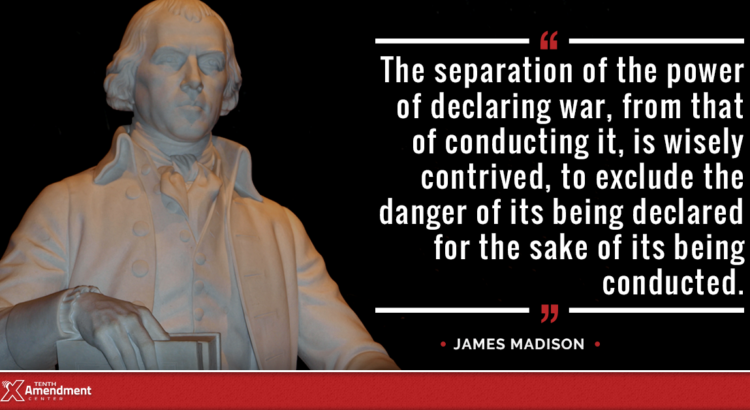Having examined (in the previous five installments of this series of essays) the background and the constitutional positing of the power to declare war in the hands of the legislature, we can now look at answering the question “What did the founders mean by the phrase ‘declare war’?”
There are two basic schools of thought on its meaning. One is to declare war is simply a formal announcement to the world that the US is in a state of war with xyz country(ies) – that is the war is already in existence. This would be the case with FDR’s call for Congress to declare war on the Empire of Japan after its attack on Pearl Harbor. The other interpretation is that Congress has the power to initiate war – to put a country(ies) on notice that the US considers itself to be on a war footing with them and will commence hostilities against them. The follow up question is then, which is it? Interpretation one, or two, or perhaps both?
In trying to define something it is many times helpful to look and see if the same concept has been expressed in other places using different words or phrases. If we take this approach it will help us to understand the founders’ frame of mind and in grasping what they intended when they wrote in the Constitution that “Congress shall have the power to…declare war.”
In the Articles of Confederation, written by many of the same men who later wrote the Constitution, three different phrases were used. In Article VI, the Congress was given the power to “engage in any war,” and to make “a declaration of war.” In Article IX it stated that congress “shall have the sole and exclusive right and power of determining on peace and war.”
In the original draft of the Constitution, in listing the enumerated powers of the legislature in Article VII, it had the simple phrase “to make war.” Going back to Madison’s essay of August 24, 1793, writing under the pseudonym “Helvidius” (see part III of this series, To Declare or Not to Declare – Part III), Madison used the terms “make war” and “declare war” interchangeably.
Putting this all together I think we can draw these conclusions: to “engage” in war doesn’t really tell us whether the engagement is preemptive or reactive. The same can be said of the idea of “determining” war. Both of those terms are rather ambiguous in clarifying the idea of “declaring” war. This leaves us with the term “make” war as an alternative to “declaring” war.
In that same part of Madison’s essay I referred to above, he related the act of making or declaring war to be the same as congress making law. So we ask, “What is implied by the phrase ‘making law’?” This simplifies the matter significantly as it is easily understood that to make something is to create that which before did not exist. There is no law until Congress legislates, creates or makes the law. Hence, the US cannot be in a state of war until Congress “makes” it so.
Thus, I believe that we can safely conclude that declaring war can be a determination that a state of war exists (such as after Pearl Harbor) and that Congress formally declares to the other nations such to be the case and authorizes the President to use our military forces to “engage” in armed conflict. Or it can also mean that Congress can declare war by making war, i.e., initiate hostilities with another nation where previously no open hostilities existed.
Hence, to “declare war” can be reactionary, i.e. a defensive statement after being attacked, or it can be an authorization to commence an act of war against another nation. Either way, however, as I’ve shown in this series of essays, that power rests solely with Congress and cannot, constitutionally, be consigned to the determination of one man/woman occupying the office of the President.
Next week, in what I expect will be the final installment in this series, we will examine who it is that Congress can declare war against and what should be done regarding this “war on terror.”
-June 9, 2017
